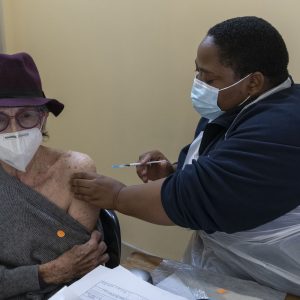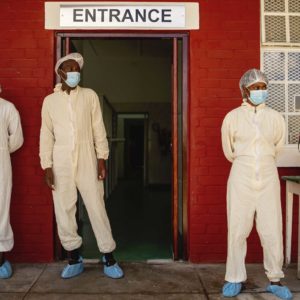Universities’ mandatory vaccination conundrum
Some institutes of higher education have made being inoculated against Covid-19 a requirement for admission next year while others are still debating their vaccination policy.
Author:
14 December 2021

Some universities have announced that Covid-19 vaccination will be mandatory for admission from 2022, but there is still uncertainty about how the academic year will look as most institutions of higher learning continue to debate the matter.
The University of the Western Cape (UWC), University of Cape Town, University of the Witwatersrand (Wits) and University of Johannesburg have announced that only vaccinated people will be allowed on campus and to attend university events. The Durban University of Technology has also made vaccination mandatory, but opened the door for those who can’t adhere to this by stating that they will have to produce a negative Covid-19 test to enter the campus or work virtually.
“Prospective students will have the option to register online to accommodate those who are not vaccinated. There will also be online consultations and virtual curriculum advising services to answer any questions they might have regarding their degrees,” said UWC spokesperson Gasant Abarder.
He said it is mandatory for members of staff, students and anyone else such as service providers or visitors to be vaccinated before they are allowed on campus.
Related article:
“In-contact classes will take place in 2022 if national regulations permit. These classes will adhere to all safety requirements and regulations. Flexible online learning and teaching will continue in most faculties for 2022. Provision will thus be made for unvaccinated students to continue in this mode, where possible,” said Abader.
Wits’ student representative council (SRC) has challenged the university’s mandatory Covid-19 vaccination policy. “Our position is that we do encourage students to vaccinate and students must be given a choice, and there must be educational programmes to assist them to make well-informed decisions. However, we do not support forced mandatory vaccines … Everyone has a right to choose,” says Wits SRC president Cebolenkosi Khumalo. The SRC disapproves of mandatory vaccination because it is a “coercion by institutions of higher learning”.
Millen Mndawe, 21, a fourth-year BTech student in human resource management at the Tshwane University of Technology, is fully vaccinated and an advocate for students getting the jab. “It is going to help students engage in face-to-face classes as online learning is problematic due to load shedding.” Mndawe says resuming in-contact learning will “improve morale and build trust”.
Matriculants in the dark
There are, however, universities that have not yet announced their vaccination strategy for next year. The uncertainty is not helpful for matriculants, who are in the dark about what will be expected from them next year.
One-third of students are vaccinated, says Ramneek Ahluwalia, chief executive of student wellness centre Higher Health. “We support vaccination. We believe in vaccination and we are putting rigorous education and promotion programmes [in place] for still voluntary vaccination to increase.”
At the moment, says Ahluwalia, consultation is happening at different levels, from campus management and academia to student unions and parents. “It is very difficult for anyone to give a concrete answer on the future of January,” he says about the institutions that haven’t made vaccination mandatory.
Ahluwalia says all institutions will open in January – as was the case when the government lowered its lockdown restrictions from level three to one – but are required to follow Covid-19 guidelines.
Related article:
The two systems of governance at institutions of higher learning are fuelling the uncertainty. Universities are governed by the Higher Education Act, which allows them to make their own decisions, whereas the college system is not as autonomous.
“We respect every university that’s taking a decision on regulation. If they take it early, we fully agree with them … I want to let you know, any university that decides to put regulations like the University of Cape Town, we fully respect it. We fully support it,” says Ahluwalia.
“We are looking at phased approaches to managing vaccinated and unvaccinated students and staff at institutions that have yet to make a decision about mandatory vaccination”, says Ahluwalia. “We are looking at questions like students in the health science fraternity being vaccinated first as [part of] regulatory vaccination, because they … can carry the risk to patients.”
Bound by legislation
The first prize will always be persuading hesitant individuals to vaccinate against Covid-19, says Ahmed Bawa, chief executive officer of Universities South Africa, which represents 26 universities across all provinces.
“Universities are congregating settings with many thousands of students and staff in confined common spaces. They are also characterised by many indoor activities. These make institutions prone to outbreaks of Covid-19. Noting that we have second-year students who have barely spent any time on campus and third-year students who have spent just a year, universities are anxious to have their students back on campus,” says Bawa.
“Much learning takes place in social interactions, and there is really no substitute for good face-to-face teaching and learning. But universities are bound by a string of legislative instruments to ensure that they are safe for staff, students and visitors. Depending on the best scientific evidence there is from around the world, there is a discussion going on at the moment at our institutions to require students and staff to be vaccinated to attend campus.”
Making vaccines mandatory is one step towards high coverage at academic institutions, says Safura Abdool Karim, a public health lawyer and researcher at the Wits school of public health. She points out that we need to look at the disruption Covid-19 has caused to the education system and says, for that reason, having high levels of vaccination uptake is critical for allowing students to return to normality.
Related article:
Karim says three factors influence if someone should be subjected to mandatory vaccination. First, are they at high risk of getting Covid-19 or exposing others? Second, what are their reasons for objecting to the vaccine? “Where an individual is opposed for health reasons, they cannot take it … But where they are objecting, for example, on baseless misinformation, then the protections are a bit weaker.” Third, how easy is the institute making it to access the vaccine? “Is there sufficient vaccine available to your students and staff? Have you created a mechanism to promote information and education about the vaccine?”
Abarder reiterates Karim’s point about exemption based on substantial evidence. “Any application for exemption will be dealt with by a committee process and a decision made based on verifiable objective evidence. Applicants may apply for exemption on one or more of the following grounds: verifiable medical reasons and/or verifiable constitutional grounds and/or verifiable religious reasons.”
Ahluwalia says many factors will decide how January 2022 looks for higher education, including “how many students and staff have been vaccinated by the end of December”. As far as consultations are concerned, he asks, “What are the challenges in the student formulation? What are the issues around union? What are the issues around academia?”



